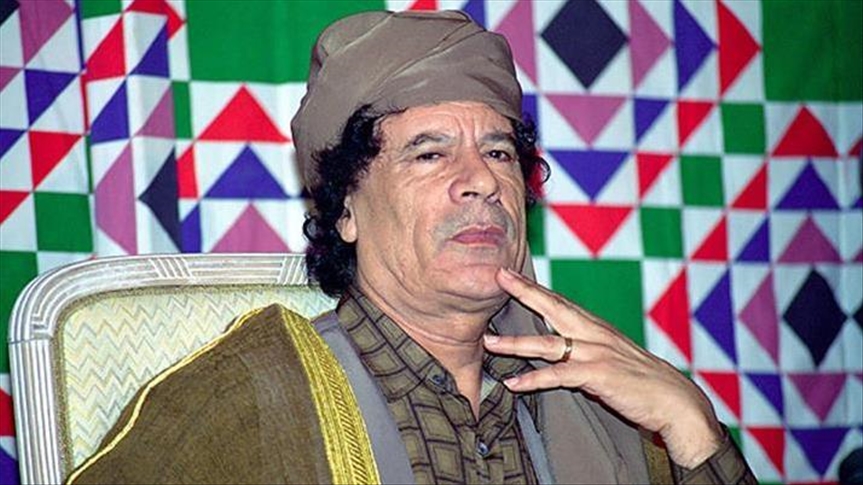
JOHANNESBURG
African intellectuals Wednesday remembered late Libyan leader Muammar Gaddafi, who was killed on Oct. 20, 2011, as a pan-African who had the best interests of the continent at heart.
“Gaddafi had a vision and strong belief of uniting Africans,” Sultan Kakuba, a political scientist at Kyambogo University in Uganda, told Anadolu Agency in a phone interview.
“He believed a united Africa would speak with one voice at international fora such as the United Nations and manage to bargain and be seen as an equal partner.”
Kakuba claimed Gaddafi was seen as an enemy of Western countries because of his longing for a “United States of Africa” which he pushed for many years, hoping one day to have a unified African government.
“Gaddafi believed this was the only way that Africa could develop without Western interference,” he said.
Mustafa Mheta, a Johannesburg-based researcher, said he equally believes Gaddafi was killed because of his objection to Western interference in African affairs.
“I think Gaddafi was murdered for standing up to the West and for trying to promote very progressive ideas for Africa, which the West don't like. They want a forever dependent on them Africa,” Mheta told Anadolu Agency in an interview.
In speeches, Gaddafi often outlined his plan to create a new united Africa with its own currency, an army to defend the continent, and a single passport.
He wanted to introduce a gold dinar to back African currencies, thus freeing them from the dollar standard.
Gaddafi also longed to protect Africa’s natural resources from what he referred to as Western “looters.”
Despite being a darling of most African countries, a record of human rights abuses and corruption in his own country turned many Libyans against Gaddafi. And when the winds of the 2011 Arab spring reached Libya, people held mass protests against him, giving Western armies an opportunity to move in.
Iqbal Jassat, an executive member of the Johannesburg-based think tank Media Review Network, told Anadolu Agency that Gaddafi’s support for anti-colonial struggles – especially the military and financial support provided to South Africa's liberation movements – endeared him to all who opposed to white minority rule.
“Being at odds with the dominant Western worldview saw him targeted for what they perceived as ‘supporting terrorism’,” said Jassat.
Despite being seen as a pan-African who sought African unity, Gaddafi was also accused of backing notorious rebel groups in Liberia and Sierra Leone, among others.
“As much as he was despised by the West, particularly France, Italy, Britain and America, he was also viewed as a threat to some African regimes,” Jassat said.
He said this explains why organs of the continent such as the African Union looked on without a whimper of protest in 2011, when Western armies were pummeling Libya with bombs.
Was intervention justifiable?
Most academics who spoke to Anadolu Agency argued that the March 19, 2021 NATO-led military intervention in Libya was unjustifiable because it plunged the country into total chaos.
“The Western invasion which culminated in the assassination of Col. Muammar Gaddafi is responsible for what is currently prevailing in Libya,” said Mheta.
Kakuba agreed that Western countries should have left the African Union to resolve the situation in Libya, giving the continental body an opportunity to solve an African problem.
“The invasion of Libya created a scenario that Africans cannot solve their own problems. The West should have left the African Union to resolve the crisis in Libya,” he said.
Jassat faulted some African countries, saying they let down Libya by voting with the UN Security Council in their resolution to bomb Libya.
He said South Africa also marred its reputation for failing to intervene and prevent the destruction of an ally.
Jassat said that South Africa and the rest of the continent bear responsibility for allowing former colonizers to triumphantly dismember a leading and successful Libya.
On March 17, 2011, South Africa, a non-permanent member of the United Nations Security Council, voted for Resolution 1973, which authorized military intervention in Libya allowing a NATO-led coalition to conduct fierce airstrikes against Gaddafi’s forces.
However, the country later condemned the bombing, saying NATO forces had distorted the mandate of the resolution by trying to topple Gaddafi instead of remaining neutral and protecting civilians. The African Union also expressed reservations over the NATO bombings.
Gaddafi’s death led to nearly a decade of civil war.
Libya has seen positive developments since this February, when rival parties agreed on a unified new executive authority to govern the country in the runup to national elections this December.








